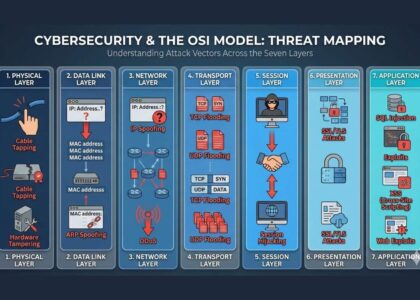Cybersecurity is one of the most in-demand and fastest-growing career fields today. With cyber threats becoming more sophisticated and frequent, organizations worldwide need skilled professionals to protect their data and systems. If you’re interested in starting a career in cybersecurity but don’t know where to begin, this guide will walk you through every step in detail.
Why Choose a Career in Cybersecurity?
Before we dive into the how-to, let’s look at why cybersecurity is a great career choice:
- High Demand: Companies across industries need cybersecurity professionals, leading to plenty of job opportunities.
- Good Salary: Cybersecurity roles offer competitive salaries, often above average for IT careers.
- Job Security: With cyber threats increasing, cybersecurity jobs are stable and future-proof.
- Diverse Roles: From ethical hacking to risk management, there are various paths to explore.
- Continuous Learning: Cybersecurity is ever-evolving, keeping your job exciting and challenging.
Step 1: Understand the Basics of Cybersecurity
If you’re new to cybersecurity, start by understanding its fundamental concepts, including:
- Cyber Threats & Attacks: Malware, phishing, ransomware, DDoS attacks, etc.
- Network Security: Firewalls, VPNs, intrusion detection systems (IDS), and intrusion prevention systems (IPS).
- Encryption & Cryptography: Protecting data through encryption methods.
- Operating Systems Security: Windows, Linux, macOS security fundamentals.
- Programming & Scripting: Basic coding skills (Python, Bash, PowerShell) can be useful.
Recommended Learning Resources:
- Books: “Hacking: The Art of Exploitation” by Jon Erickson, “Cybersecurity Essentials” by Charles J. Brooks.
- Online Courses: Cybrary, Coursera, Udemy, edX.
- YouTube Channels: NetworkChuck, Professor Messer, Null Byte.
- Websites: OWASP, SANS, NIST.
Step 2: Get Hands-on Experience
Theory alone won’t make you a cybersecurity professional. Practical experience is key. Here’s how you can gain hands-on skills:
- Set Up a Home Lab: Install virtual machines (VMs) using VirtualBox or VMware and practice ethical hacking.
- Use Capture The Flag (CTF) Challenges: Platforms like Hack The Box, TryHackMe, and OverTheWire are great for hands-on learning.
- Contribute to Open-Source Security Projects: Participate in cybersecurity communities and GitHub projects.
Step 3: Choose Your Cybersecurity Career Path
Cybersecurity is a broad field with multiple career paths. Choose one based on your interests:
1. Ethical Hacking & Penetration Testing
- Role: Simulate cyberattacks to identify vulnerabilities.
- Skills Needed: Penetration testing, vulnerability assessment, Linux, Python.
- Certifications: Certified Ethical Hacker (CEH), Offensive Security Certified Professional (OSCP).
2. Security Analyst
- Role: Monitor, analyze, and respond to security incidents.
- Skills Needed: SIEM tools, threat intelligence, incident response.
- Certifications: CompTIA Security+, Certified SOC Analyst (CSA).
3. Network Security Engineer
- Role: Secure network infrastructures from cyber threats.
- Skills Needed: Firewalls, IDS/IPS, VPNs, TCP/IP.
- Certifications: Cisco Certified CyberOps Associate, CCNA Security.
4. Cloud Security Specialist
- Role: Secure cloud environments like AWS, Azure, GCP.
- Skills Needed: Cloud security best practices, IAM, DevSecOps.
- Certifications: AWS Certified Security – Specialty, Microsoft Certified: Azure Security Engineer Associate.
5. Digital Forensics & Incident Response (DFIR)
- Role: Investigate cybercrimes and respond to security incidents.
- Skills Needed: Memory forensics, malware analysis, evidence handling.
- Certifications: GIAC Certified Forensic Analyst (GCFA), Certified Incident Handler (GCIH).
Step 4: Get Certified
Certifications validate your skills and make you stand out. Here are some beginner and advanced cybersecurity certifications:
Beginner Certifications:
- CompTIA Security+
- Certified Cybersecurity Technician (CCT)
- Cisco CyberOps Associate
Intermediate Certifications:
- Certified Ethical Hacker (CEH)
- GIAC Security Essentials (GSEC)
- Systems Security Certified Practitioner (SSCP)
Advanced Certifications:
- Offensive Security Certified Professional (OSCP)
- Certified Information Systems Security Professional (CISSP)
- GIAC Penetration Tester (GPEN)
Step 5: Build a Cybersecurity Portfolio
A portfolio helps showcase your skills and projects. Here’s what you can include:
- Write blogs on Medium or personal websites about cybersecurity topics.
- Document your CTF challenges and solutions on GitHub.
- Contribute to open-source security tools.
- Publish research papers on security vulnerabilities.
Step 6: Gain Real-World Experience
Landing your first cybersecurity job can be challenging without experience. Here’s how to get it:
- Internships: Look for internships at IT companies, government agencies, or cybersecurity firms.
- Freelancing: Platforms like Upwork, Fiverr, and Bugcrowd allow you to work on security projects.
- Volunteer Work: Non-profits often need cybersecurity help and can give you experience.
Step 7: Apply for Cybersecurity Jobs
When you’re ready to apply, follow these tips:
- Optimize Your Resume: Highlight certifications, projects, and hands-on experience.
- Prepare for Interviews: Learn common cybersecurity interview questions and participate in mock interviews.
- Network: Connect with professionals on LinkedIn and attend cybersecurity conferences like DEF CON and Black Hat.
- Use Job Boards: Check websites like LinkedIn, Indeed, and CyberSecJobs for job openings.
Step 8: Keep Learning and Growing
Cybersecurity is a dynamic field. Stay updated by:
- Following cybersecurity news and blogs (KrebsOnSecurity, Dark Reading).
- Joining online communities like r/netsec on Reddit, Discord cybersecurity groups.
- Attending webinars, workshops, and industry events.
Final Thoughts
Starting a career in cybersecurity requires dedication, continuous learning, and hands-on experience. Follow the steps outlined in this guide, and you’ll be well on your way to building a successful cybersecurity career. Whether you want to become an ethical hacker, security analyst, or forensics expert, the opportunities in this field are limitless.
Now, take the first step—start learning, practice your skills, and enter the exciting world of cybersecurity!






